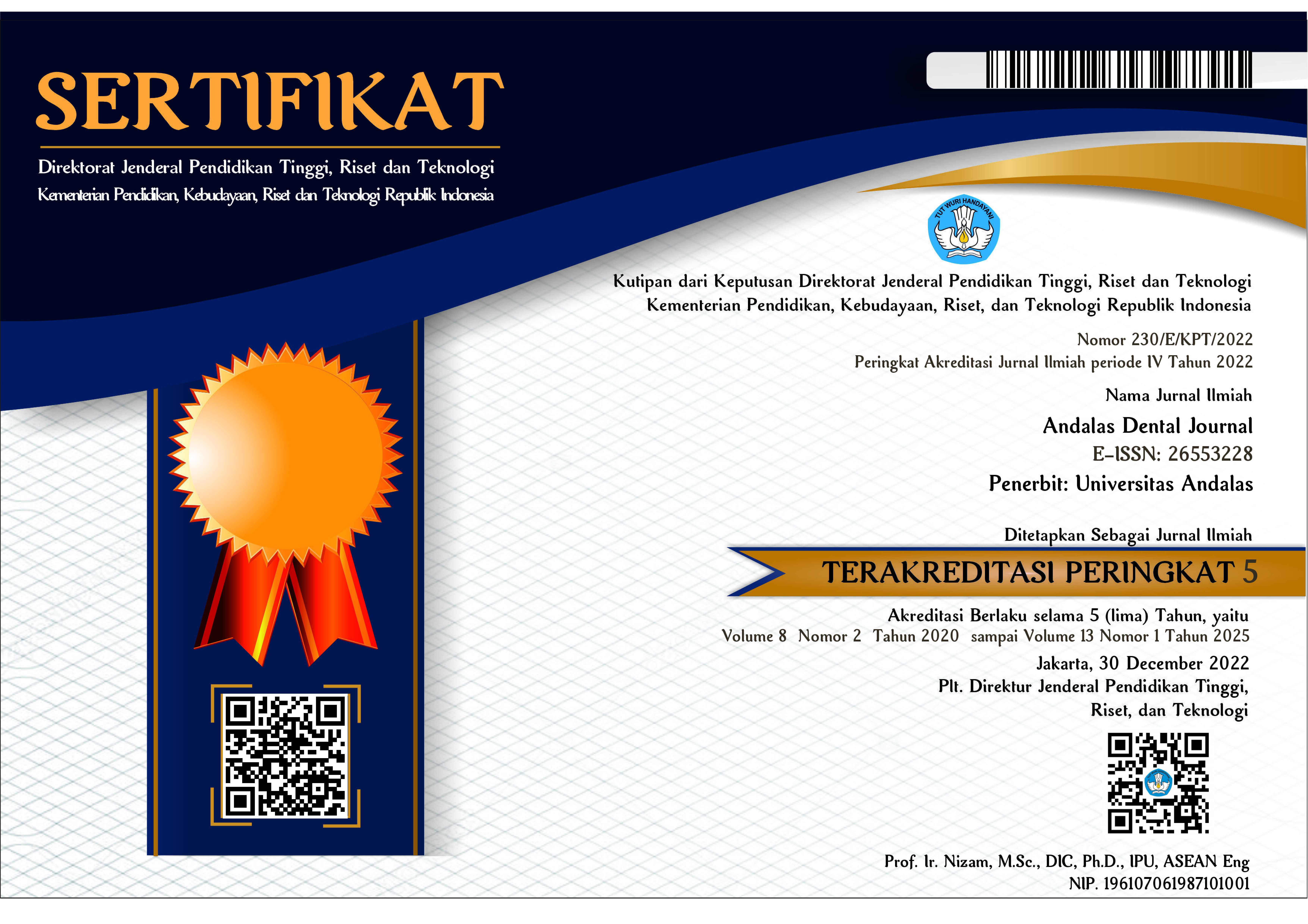EFFECTIVENESS OF 5% GUAVA LEAF (Psidium guajava Linn) EXTRACT OF WHITE FRUIT VARIANT TO DECREASE LEVELS OF Volatile Sulfur Compounds (VSCs) IN HALITOSIS SUFFERERS
Abstract
Halitosis is a general term used to describe the bad breath coming out of the oral cavity. Volatile Sulfur Compounds (VSCs) are a major component causes of halitosis, formed from the break down of protein substrate by gram-negative anaerobes such as Porphyromonas gingivalis, Tanerella forsythia, Fusobacterium nucleatum, Prevotella intermedia and Treponema denticola. Guava leaf (Psidium guajava Linn) contain high levels of quercetin compounds that can inhibit the growth of Porphyromonas gingivalis and Prevotella intermedia. This study aims to determine the effectiveness of 5% guava leaf (Psidium guajava linn) extract of white fruit variant to decrease levels of Volatile Sulfur Compounds (VSCs) in halitosis sufferers. This research method was pre-experimental which consists of 19 subjects. The guava leaf (Psidium guajava Linn) extract was made by maceration method and diluted with distiled water at 5% concentration. The levels of Volatile Sulfur Compounds (VSCs) were measured by breath checker before (pre test) and after (post test) treatment. Wilcoxon test showed that there was a significant difference between the levels of Volatile Sulfur Compounds (VSCs) before and after gargling with 5% guava leaf (Psidium guajava Linn) extract of white fruit variant (p<0,05). The conclusion of this research was 5% guava leaf (Psidium guajava Linn) extract of white fruit variant effectively decreases levels of Volatile Sulfur Compounds (VSCs) in halitosis sufferers.
References
2. Krespi, Y.P., M.G. Shrime, dan A. Kacker. The Relationship Between Oral Malodor and Volatile Sulfur Compound–Producing Bacteria. Otolaryngology–Head and Neck Surgery. 2006; 135: 671-676.
3. Porter, S.R., C. Scully. Oral Malodour (halitosis). British Medical Jornal. 2006; 333(7569): 632-635.
4. Aylikci, B.U., H. Colak. Halitosis: From Diagnosis to Management. Journal of Natural Science, Biology and Medicine. 2013; 4(1): 14-23.
5. Armstrong, B.L., M.L. Sensat, J.L. Stoltenberg. Halitosis: A Review of Current Literature. The Journal of Dental Hygiene. 2010: 84(2).
6. Widagdo, Y dan K. Suntya. Volatile Sulfur Compounds sebagai Penyebab Halitosis. Interdental JKG. 2007; 8(1): 5-9.
7. Gunardi, I., Y.S. Wimardhani. Oral Probiotik: Pendekatan Baru Terapi Halitosis (Tinjauan Pustaka). Indonesian Journal of Dentistry. 2009; 16 (1): 64-71.
8. Piboonratanakit, P.Y., T. Vachirarojpisan. Prevalence of Self-Perceived Oral Malodor in a Group of Thai Dental Patients. J Dent (Tehran). 2010; 7(4): 196-204.
9. Departemen Kesehatan RI. Laporan Hasil Riset Kesehatan Dasar (RISKESDAS) Nasional. Badan Penelitian dan Pengembangan Kesehatan: Jakarta. 2013.
10. Mir, R.A., M. Shafi., P. Gupta., M.U. Yousuf, A. Daing. Halitosis: A Review Article. International Journal of Current Research. 2013; 5(12): 3758-3762.
11. Pratibha, P.K., K.M. Bath., G.S. Bath. Oral Malodor: A Review of the Literature. Journal of Dental Hygiene. 2006: 80(3).
12. Farah, C.S., L. lntosh., M.J. Cullough. Mouthwashes. Aust Prescr. 2009; 32: 162-164.
13. Hardjawinata, K., I. Sufiawati., N. Djustiana., Muchtariadi, dan S.O. Dewi. Ekstrak Daum Jambu Biji (Psidium guajava) sebagai Obat Kumur untuk Pengobatan Gingivitis pada Wanita. Kerjasama Kemitraan Penelitian Pertanian Dengan Perguruan Tinggi (KKP3T): Bandung. 2009.
14. Shetty, S., G. Vivekanandan., S. Patil, dan S.B. Mangalekar. Psidium Guajava: A Potential Adjunct in the Management of Periodontal Diseases- A Review. International Journal of Innovations in Dental Sciences. 2017: 2(2).
15. Indriani, S. Aktivitas Antioksidan Ekstrak Daun Jambu Biji (Psidium guajava L.). J. II. Pert. Indon. 2006; 11(1): 13-17.
16. Daud, M.F., E.R. Sadiyah, dan E. Rismawati. Pengaruh Perbedaan Metode Ekstraksi terhadap Aktivitas Antioksidan Ekstrak Etanol Daun Jambu Biji (Psidium guajava L.) Berdaging Buah Putih. Program Studi Farmasi, Universitas Islam Bandung. Bandung. 2011.
17. Dwiyanti. Daun Jambu Biji (Psidium guajava L.) sebagai Antikanker Payudara. Pharm Sci Res. 2015: 2(2).
18. Shu, Y., Y. Liu., L. Li, H. Wu. Antibacterial Activity of Quercetin on Oral Infectious Pathogens. African Journal of Microbiology Research. 2011: 5(30).
19. Geoghegan, F., R.W.K. Wong., A.B.M. Rabie. Inhibitory Effect of Quercetin on Periodontal Pathogens In Vitro. Phytother. Res. 2010; 24: 817–820.
20. Rachmi, D.W., D. Rianti, dan A. Meizarini. Daya Hambat Ekstrak Daun Jambu Biji Merah (Psidium guajava Linn) dalam pasta gigi terhadap Porphyromonas gingivalis. Material Dental Journal. 2016; 7(1): 34-39.
21. Guintu, F.Z. dan A.H. Chua. Effectivity of Jambu biji Leaves (Psidium guajava) as Mouthwash for Patients with Aphthous Ulcers. Philippine Journal of Otolaryngology Head and Neck Surgery. 2013: 28(2).
22. Wiguna, R.K.B. Pengaruh Variasi Ekstrak Daun Jambu Biji (Psidium guajava) sebagai Bahan Obat Kumur terhadap Daya Hambat Pertumbuhan Bakteri Porphyromonas gingivalis. Material Dental Journal. 2016; 7(1): 34-39.
23. Ueno, M., T. Yanagisawa., K. Shinada., S. Ohara, dan Y. Kawaguchi. Prevalence of Oral Malodor and Related Factors Among Adult in Akita Prefecture. J Med Dent Sci. Vol. 54: 159-165.
24. Lee, C.H., H.S. Kho., S.C. Chung., S.W. Lee., Y.K. Kim. The Relationship Between Volatile Sulfur Compounds and Major Halitosis-Inducing Factors. Journal of Periodontology Online. 2003; 74(1): 32-37.
25. Donaldson, A.C., D. McKenzie., M.P. Riggio., P.J. Hodge., H. Rolph., A. Flanagan, dan J. Blagg Microbiological. Culture Analysis of The Tongue Anaerobic Microflora in Subjects With and Without Halitosis. Oral Disc. 2005; 11(1): 61-63.
26. Kraivaphan V., Boonyamanound L., Amornchat C., Trirantana T, dan Kraivaphan P. The Effect of a Mouthrinse Containing Psidium guajava Leaf Extract on Gingivitis. J Dent Assoc Thai. 2001; 41:323–8.
27. Fathilah, A.R., M. Yusoff., Z.H. Oathman. Bacteriostatic Effect of Piper Betle and Psidium guajava Extracts on Dental Plaque and Bacteria. Journal of Biological Sciences. 2009; 12(6): 518-521.















